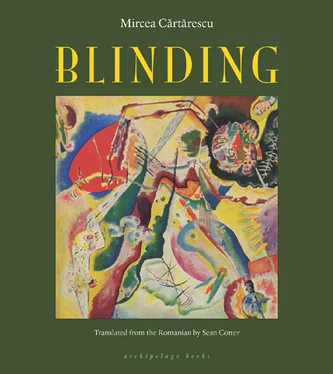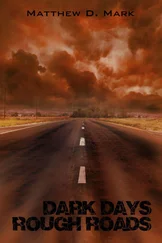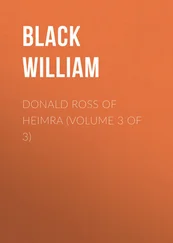ALINE of sleighs without bells, pulled by small, puffy-maned horses with hooves wrapped in strips of leather, led the entire Badislav Clan to salvation — their bold and hearty infants and women, their sacks of grain, hanks of lard-smothered pork, and the vestments, icons and stoles for the priest, who sat dressed like an ordinary peasant and lashed the mare’s shiny brown back while she plodded calmly between the reins in front of him. The mare whipped him on the cheek with her coarse, golden tail, flashing her pitch black birther between her haunches. There was no visible road ahead, only the field that led to the Danube and to escape, covered with a snow that reached the horses’ chests. Glades of thin, young trees with twigs petrified in the frozen air, as if painted with sepia, fell behind on one side and the other. Crows, like black leaves, hopped between trees, shaking snow from the boughs. A melted-gold sun pushed out transparent shadows behind the sleighs and drew thin trees onto the waves of snow, growing from the same roots as the vertical trees, but they stretched longer and seemed to have more branches. The seven sleighs were packed with all that remained of the village they had left, charred and smoking, its alleyways and cottages filled with dead bodies, picked at by wolves and vultures. In that year of terror, no Turks had devastated them, no gale of flame or Albanian warlords. If you had asked one of the Bulgarian women with a mantle of coins and a scarf pulled over her ugly face, her desperate and quivering eyes limpid as a goat’s, she might have winced and crossed herself, but she would not have answered you, because all of them wanted nothing more than to forget. In their sheepskin coats, the children huddled together at the bottom of the sleigh, some with a black puppy whose hips trembled as though possessed. They would only let themselves remember the isolated hamlet in a ravine in the Rhodope mountains, surrounded by basalt peaks, just a footpath through the rock, overlooking flowering fields and fertile gardens as far as you could see. The village was held together by complicated sets of relations — everyone was someone’s cousin or godparent, everyone lived in fear of God near the little church without a steeple in the village’s center. In summer, they bent over rows of tomatoes and green peppers, while the children took the cows to graze. They made endless dandelion chains or fought with beautifully carved and decorated staves. The sky above was brilliant like a flower opening its transparent-blue petals over the valley.
Next to the hamlet was a cemetery crowded with crosses, bent by time, inscribed in tremulous Cyrillic letters. The oldest stones were so laden with moss and pocked by lichen that they looked like deformed sponges, discarded onto the black earth, surrounded by crocuses and wild arum. In the incense-filled church, the priest prayed for the living and dead as often as possible, and tallow candles constantly burned, blackening the low ceiling like the bottom of a pot. Kolaches and coliva, rice with milk and smoked prunes were the food of the dead. They were sent down the thread of water called Bârzova Creek in little wooden boats loaded with candles at the proper liturgical times. The old people of the village passed into their dormition in God with slow songs in their ears, all through the night of vigil, describing the pilgrimage that awaited them: how they would have to befriend an otter to cross the black waters, a wolf to find their path through the thick forest, a golden weasel to guide them toward their family’s house, where they would embrace their mother and father, and they all would be pulled close to She who Gave Birth to God and to the Infant of Light.
That year, however, had been the year of the poppy. As early as the winter, the Badislavs’ bruised palms had held the tiny, ashen poppy seeds, unknown to them at the time, brought by a caravan that traveled the Balkans, thieving and reading the future in snail shells. While combing the fleas from their bears, the gypsies had told of a miraculous flower that made dreams, that quieted infants and kept them asleep like logs through the night, that widened a woman’s pupils and gave her the desire to mate. The seeds were good in aromatic pastries, kneaded with honey, and if you squeezed the saints’ milk from the pods, you went to heaven while you were still alive and you met angels in the clouds. For the seeds, for a little sack full of seeds, the gypsies asked for four beautiful fiddles that still smelled of pine sap, with sheep-gut strings, the craft of some of the villagers. Then the caravan left, all at once, melting into the air as though it had never been.
The poppy seeds, light as paper, stayed behind, and the Badislavs planted a full row of them in the black, buttery earth, between the zucchini and lettuce. In the depth of summer, the flowers opened their purple petals with black folds, like the tongues of hanged men, on stalks with pallid green-blue leaves, splashed with lime-white. After the petals withered and became one with the earth, the milky pods were left, releasing a stench so sweet that birds would not fly over the poisoned field, nor would beetles or locusts brave the pale stalks. Soon, the pods grew as big as babies’ heads and their seeds rattled inside. The women held scythes and walked through breast-high fields and spent the day cutting poppies, weak with laughter, since the pods reminded them of the hanging fruits of their men. They carried the pods in baskets to their front porches, and there in the twilight, still laughing, they wrung out the thick, spermy sap and spread the “gypsy seed,” as they called it in the end, to air on copper platters. After a few days the milk curdled. First it turned as hard as cheese, then as hard as rocks. It looked like a soapy chalk, a white-blue crust that the women pressed into pills and ground as fine as the dust of the road. They made kolaches and Turkish pastries, scattering the magic powder into the sweetness of jams and honey. They mixed it with wine and pear brandy, they put it in milk with mămăligă and cigarettes that they rolled themselves from dried corn husks. The entire village came together for an unforgettable festival, as though it were the middle of winter. They drank and told jokes until the poppy vapors went to everyone’s heads at once. From boys to old men, they all fell into a strange trance, for an angel of light showed itself to them, naked, with a woman’s breasts and a man’s shame, with golden hair in thousands of braids. And the angel said to them, “You are without sin. Be like your Adam and your Eve, because your sins have been forgiven.” And everyone, boys and girls, husbands and wives, took off their sheepskin coats and long shirts and began to mate together in a writhing pile among the dogs and children, mothers with sons, fathers with daughters, brothers with sisters, their pupils as big as their irises and clear, cold sweat dripping from their cheeks, and they didn’t stop until autumn appeared, first as mild as grape juice, then as bitter as black wine. Flickering gold and rust touched the hills, while in the valley, the village slowly fell apart and the cattle moaned with hunger. Smoking mahorka mixed with gypsy seeds, the women lay on benches, staring at the wood in the stove and ignoring everything else. The women gazed at their children and let them toddle off through the ravines. Then they went to the village, their faces and nipples painted, to find some hardy soul whose weight they had yet to feel. Feeling their way inside a dark barn full of straw bales and bugs with cross-marked backs sated in the center of their cobwebs, the women, who had married as virgins and never dared to raise their eyes from the ground in front of their men, now pulled their skirts up to their faces to exhibit their thick thighs and the hairy mounds between them, and they let themselves be mounted there, on sacks of grain, among bridles and reins rubbed with tallow.
Читать дальше












